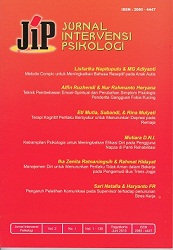Main Article Content
Abstract
77ms study aims to test whether a Gratitude-Cognitive Behavior Therapy (G-CBT) can reduce the symptoms of adolescent depression. G-CBT is a therapy to reduce depression by increasing gratitude feeling through CBT methods. The subjects are adolescents, aged 13-18 years, female and had depression score of 7-9 standard (high). Scale is used to detect depression in teenagers is the Depression Scale of the Gadjah Mada University's Personality Scale. Design of experiment are Non-randomized study ofPre-Posttest Control Group Design. The method of data analysis using the Mann-Whitney analysis to determine whether there are effects of G-CBT in reducing adolescent depression. Studies showed Z = -3.707and p = 0.000; p <0.05. This means that there are differences in depression rates between the groups receiving therapy or treatment with the group that did not get the therapy. So, the conclusion from this study indicate thatthe G-CBT can reduce levels of depression experienced by adolescents.
Keywords: Gratitude-Cognitive Behavior Therapy, depression, adolescent
Article Details
Authors who publish with this journal agree to the following terms:
- Authors retain copyright and grant the journal right of first publication with the work simultaneously licensed under a Creative Commons Attribution-ShareAlike 4.0 International License that allows others to share the work with an acknowledgment of the work's authorship and initial publication in this journal.
- Authors are able to enter into separate, additional contractual arrangements for the non-exclusive distribution of the journal's published version of the work (e.g., post it to an institutional repository or publish it in a book), with an acknowledgment of its initial publication in this journal.
- Authors are permitted and encouraged to post their work online (e.g., in institutional repositories or on their website) prior to and during the submission process, as it can lead to productive exchanges, as well as earlier and greater citation of published work (See The Effect of Open Access).





